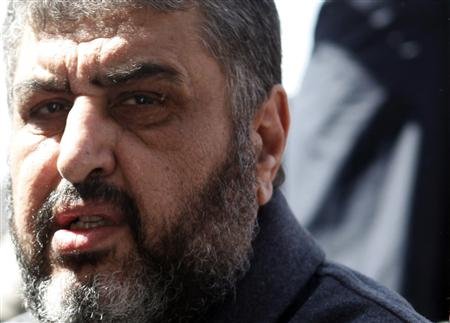
Khairat al-Shater, the Muslim Brotherhood's primary presidential candidate, held the very first rally of his campaign in front of a packed auditorium at Al-Azhar University on Tuesday. It didn’t go exactly as planned.
Despite the large turnout and show of support from students and faculty at Al-Azhar University — known to be a bastion of Brotherhood support in recent years — Shater had to endure prolonged heckling from a student upset with his decision to run, and an onstage scuffle with a supporter of Salafi Sheikh Hazem Salah Abu Ismail, who sees Shater’s nomination as a betrayal to the Islamist vote, which may otherwise have gone to Abu Ismail.
The disturbances likely came as a surprise to Shater, who chose Al-Azhar as his campaign’s first major stop.
“Egypt in its entirety chose to be an Islamist reference point through the referendums and elections. Al-Azhar’s moderate Islam represents the cornerstone of this reference point,” Shater said.
The campaign seems intent on highlighting the injustice Shater faced through his life to attract voters. Some students looked teary-eyed at a video that preceded Shater’s appearance titled “From Prisons to Ruling Egypt.” Similarly he pointed to the symbolism of beginning his campaign at Al-Azhar, because his last prison stint was due to allegations that he was forming combat militias after a martial arts exhibition by Brotherhood Al-Azhar students in 2006.
When describing his Renaissance Project, the name for Shater’s platform, he pointed out that he came up with it while in jail, along with some of his fellow inmates.
Turkey played a central role in Shater’s campaign event. While waiting for his arrival, one song played on the loudspeaker more than others. Its chorus says, “New Egypt’s Erdogan,” a reference to the Turkish prime minister from the moderate Islamist Justice and Development Party.
“Turkey was able to quadruple its national income in 10 years,” Shater said, introducing the first benchmark he thought the Renaissance Project could achieve. Shater did not mention how the income was distributed, but did imply that all Turks benefited from the growth.
To many of those non-Brotherhood members present, former intelligence chief Omar Suleiman’s candidacy in the presidential race was a main instigator for showing up and supporting Shater.
“He’s the only one I think is capable of beating [Suleiman],” said Abdel Hamid Issa, an Al-Azhar statistics professor. And if Shater is disqualified, Issa will support “the one after him,” he said, referring to the Brotherhood’s backup candidate, Freedom and Justice Party head Mohamed Morsy.
Others at the rally said that Shater’s nomination would split the Islamist vote, opening the door for other candidates and remnants of the old regime a chance to win.
Zakareya Abdel Hamid, an Al-Azhar student studying physical education, could not contain himself. He began screaming from the back of the room, “Why did [the Brotherhood] go back on their word and nominate you when they could have rallied behind one person?”
His question turned into heckling until Shater’s camp invited him on stage to ask his question. Shater, however, saw no contradiction in the Brotherhood’s decision to nominate him and seemed to weather the heckling with grace.
“We needed some executive power to enact our reform plan, and recent events showed us that without the executive power, we cannot be as effective legislatively,” he said.
The main turning point for the Brotherhood, Shater said, was when Ganzouri’s government did not respond to the Freedom and Justice Party's request to wait on the IMF loans either until after presidential elections or after the FJP forms a new transitional government, so that a government with more staying power is in charge of taking on and repaying debt.
Abdel Hamid also questioned Shater on his relative silence regarding the rights of the victims — those killed, injured or imprisoned — of the 25 January revolution. Shater replied that the issue has no bearing on his presidential campaign.
Prior to Abdel Hamid’s question, an Abu Ismail supporter had to be physically restrained after storming on stage, grabbing a microphone and repeatedly chanting the campaign rallying cry, “Hazemoon.”
Dozens of Abu Ismail supporters gathered outside the auditorium to chant against Shater’s nomination during his speech.
“I have no objections over Shater as an individual. It’s the principle that matters. The Brotherhood fired Abdel Moneim Abouel Fotouh for going against the party’s decision. So why is it OK for the party itself to go against its decision?” said Emad al-Sayed, an Al-Azhar commerce student. Sayed, an Abu Ismail supporter, stood with the protests outside because of what he saw as “an attempt to divide the Islamist vote.”
Despite the objections and interjections, Shater was able to leave on a high note. The ever-organized Brotherhood rallied its masses with chants of prayer and supplication whenever the auditorium got rowdy. Shater was able to keep the crowd interested with his tales of injustice under the old regime, especially his claims that Mubarak's sons are being detained in the same cellblock he was imprisoned in ostensibly under orders from Gamal Mubarak, who “was afraid I’d ruin his plans to inherit the throne,” Shater said.
The Brotherhood members in Al-Azhar seem to be wholeheartedly behind Shater.
“Growing up with the Brotherhood, we all know never to go out and make decisions on our own without group consensus,” Shater said, referring to the obedience tenet of Brotherhood membership.
This message resonated with mathematics professor Haitham Abbas, who said, “Abouel Fotouh is a good man, but there’s no question about me giving my vote to Shater. Read the Muslim Brotherhood’s history — you’ll see the only reason they remained so strong is that they were adamant about unity.”
Still, some are waiting to hear a full platform and details of what the Renaissance Project entails before giving Shater their votes.
“I was an Abu Ismail supporter. Now I’m giving my vote to Abouel Fotouh,” said Al-Azhar commerce professor Saeed Abdel Al. “He has a great platform. I haven’t heard enough from Shater. It is unfortunate I didn’t get a chance to hear some of it today.”




